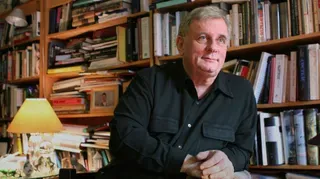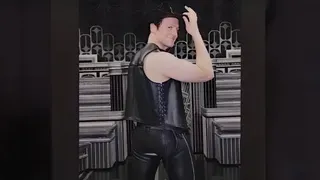December 30, 2013
Movies :: Kilian Melloy's Best of 2013
Kilian Melloy READ TIME: 11 MIN.
EDGE's critic Kilian Melloy makes his choices for the best films of 2013:
12 Years a Slave
Steve McQueen's drama about Solomon Northup (Chiwetel Ejiofor) carries the sting of historical truth: Northup was a free black man, and a fine musician, living in the North until he was abducted and sold into slavery down South. There, he endured over a decade's worth of forced servitude.
Like the Forest Whitaker vehicle "Lee Daniels' The Butler," this film graphically illustrates what it's like living as the "wrong" kind of person in a society where people can own people and treat them (or mistreat them) like any other kind of property -- including the perpetration of rape and murder without legal consequences. But "12 Years A Slave" also vividly portrays the human spirit's power to endure and the untarnishable nature of authentic dignity.
Gravity
Alfonso Cuar�n proves that his visual style and storytelling chops still rule in this yarn about astronauts hammered by orbiting debris. Sandra Bullock takes point with her portrayal of one of cinema's most sophisticated and adventurous female characters (despite still needing a guy like George Clooney as a crutch -- but what a crutch!). The cinematic verve and atmospheric suspense of Cuar�n's earlier classic "Children of Men" is at work here, too, though this is more an action-adventure movie than the sometimes-grim meditation "Children" was.
The Place Beyond The Pines
Derek Cianfrance's "The Place Beyond the Pines" is like three movies in one. First we follow Ryan Gosling's motorcycle stunt-rider into the scariest trick of all -- a committed relationship, fatherhood -- then we plummet into a personal hell of doubt, regret, and self-recrimination with Bradley Cooper's cop, and finally we see those two strands twine into something jagged and primally fierce as two boys, the sons of those two characters, meet up. It's a matter of bad chemistry that turns out to be explosively volatile.
Still Mine
James Cromwell and Genevi�ve Bujold play an unassuming, self-reliant couple who are well into their later years but still going strong. When the specter of dementia manifests itself, Cromwell's stolid farmer -- determined to let his wife live out her last days at home with him -- starts work on a new, single-story house, which will be easier and safer for her. But bureaucratic forces interfere with a series of regulations and requirements that feel more like a shakedown than anything enacted in the public interest.
This film, based on a true story, has an earnest feel about it, but also a hardheaded determination, thanks to Cromwell's excellent performance.
The Bling Ring
Writer-director Sophia Coppola lets this scathing indictment of pop vacuousness tell itself in the boudoirs and closets of the rich and famous, where a band of ethically clueless teens intrude, intent on a peculiar modern brand of shopping. (Ordinary people will still recognize it as what it is: Stealing.)
This film is based on real events; otherwise, you'd never believe the depths to which these entitled, self-absorbed kids sink, with the media diving to the bottom right on their heels and treating them as celebrities in their own right, just because they had the imagination and daring (or the blunt, stupid greed) to rob celebrities. This is the cautionary tale for our time: A story of bursting closets and empty souls.
Dallas Buyers Club
Matthew McConaughey dropped forty pounds of muscle to achieve the gaunt look of small-time hustler and rodeo worker Ron Woodruff, a raging heterosexual who found out the hard way that AIDS is not the "gay" disease straight America assumed it to be. But rather than do the predictable thing and bury himself in his usual vices, Woodruff got smart and got educated. In the process, he learned that the only one really willing and able to help him, and others like him, to procure life-saving medication was himself -- the government being only too happy to drag its feet while gays dropped dead.
McConaughey's transformation notwithstanding, Jared Leto steals the show as Rayon, a tough transwoman. Jean-Marc Vall�e directs.
Spring Breakers
Harmony Korine's film is the ultimate "girls gone wild." Four female college students take to robbery as a means of raising funds to go partying for spring break, only to meet up with an outlaw who calls himself Alien (James Franco) and become embroiled in his subterranean world of crimes, drugs, and violence.
But this isn't "Scarface" with bikinis; there's humor, and love, and plenty of disorientation, as Korine's script scrambles the sequence of events and his direction makes everything seem to unfold as though through the eyes of someone messed up on pills or powders. Part mind trip, part morality play, this is a movie you might not entirely enjoy -- but you won't forget it.
Gimme The Loot
As always, there were plenty of worthwhile independent movies this year; "Europa Report" stood out and stood above most of the big-budget sci-fi projects; "The Go Doc Project" ranked as one of the most memorable gay films of recent years. But Adam Leon's urban comedy "Gimme the Loot," with its big-hearted pair of friends (played by Ty Hicks and Tatiana Washington), its effortlessly rolling story, and its potent, street-level charm, made indie films look simultaneously fun and bracing in a way they too often aren't but should be.
Upstream Color
If you thought Shane Carruth's debut feature, the brain-bending time travel film "Primer," was a wild ride, buckle up extra tight for "Upstream Color." Mental telepathy? Group mind? Hive consciousness? What exactly is it that binds the two main characters (Carruth and Amy Seimetz) together?
The answer has to do with a water-borne organism that connects different forms of life... maybe into a continuous web? Or at least a strange little telepathic commune of humans, pigs, and orchids? This film is as austere as it is strange, and as elegant as it is gnomic. It's an accomplishment that puzzles and tantalizes, and rewards you by not giving you any easy rewards.
What Maisie Knew
Based on a story by Henry James and updated for our contemporary world, "What Maisie Knew" features a gripping performance by a young talent named Onata Aprile. She plays the title character, a child whose parents (Julianne Moore and Steve Coogan), a pair of high-flying artistic types, fight bitterly over her even though neither of them is any good at the parental thing. Far more responsible are her stepfather, the down-to-earth Lincoln (Alexander Skarsg�rd) and her Irish nanny, Margo (Joanna Vanderham).
Though adapted from a story that's more than a century old, the film retains a contemporary feel and a timeless message: You can't (or shouldn't) have a child and remain a child yourself. Count this film as a simple, but powerful, lesson in what it means to have "family values."
Kilian Melloy serves as EDGE Media Network's Associate Arts Editor and Staff Contributor. His professional memberships include the National Lesbian & Gay Journalists Association, the Boston Online Film Critics Association, The Gay and Lesbian Entertainment Critics Association, and the Boston Theater Critics Association's Elliot Norton Awards Committee.







